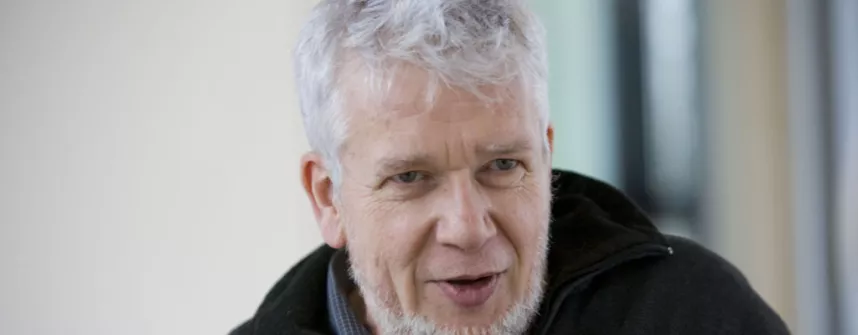Researching what holds the world together
January 27, 2017
No, Klaus Boehnke can not complain about a lack of work. Globalization, refugee crisis, rightwing populism, nationalism – societies are in flux, cohesion is breaking down. Everyone just thinks about himself. Or is that really so? Identifying changes in the way we live together, recording social trends, and using them to reach conclusions are all part of the work area of the Professor of Social Science Methodology at Jacobs University in Bremen. Boehnke measures what is.
How to record, analyze, and prepare data, that is his area of specialization. And it is not about bits and bytes, but about moods, currents, opinions, feelings in the population. Boehnke usually measures them through surveys and questionnaires. He teaches his students how to design them according to scientific criteria and how to conduct an interview for research purposes.
Under his leadership, a representative survey was recently conducted among 2600 citizens of Bremen regarding cohesion in the city; it was commissioned by the Bertelsmann Foundation and sponsored by the business association of the Bremen housing sector, the agWohnen Bremen Bremerhaven. Cohesion on the Weser is doing well, despite different living conditions in the various parts of the city. Another question is the state of cohesion in the world as a whole. There, too, Boehnke is not particularly alarmed, despite tendencies toward isolationism, as observed, for instance, in Great Britain and the USA. He is not an “alarmist,” he says. “Societies have become more diverse, these phenomena are part of that.”
The 65-year-old works for an institution that stands for just the opposite: for openness to the world, for cultural cooperation, for equal rights for the cultures. Boehnke is Vice Dean of the Bremen International Graduate School of Social Sciences (BIGSSS), an inter-university institution run jointly by the University of Bremen and Jacobs University. At this English-language graduate school, some 80 students from 35 nations are pursuing their doctoral degrees in the core disciplines of political science, sociology, and psychology.
BIGSSS is something special, not only because of its internationality. As with the Bachelor and Master degrees, the doctoral candidates participate in a degree program with various courses that enable them to engage in an exchange across disciplinary boundaries. They are no longer lone wolves, no longer dependent upon just one professor and one focal topic. Instead, they are supported by a committee of three to five faculty. One of the members is from another university and usually at least one committee member has a background in a discipline different from the discipline for which the degree is pursued, perhaps an economist, a mathematician, or a computer scientist. “Interdisciplinary collaboration is the order of the day here,” says Boehnke.
The concepts of internationality and transdisciplinarity were what drew him to Bremen and for which he gave up a tenured professorship of sociology at Chemnitz University of Technology. Boehnke himself has been a wanderer among the disciplinary worlds, first studied English and Russian, later got a doctorate and became a university lecturer in psychology, and then worked at an education department, then became a sociology professor.
For more than 15 years, now, since February 1, 2002, he has been working on the campus in Bremen-North. The move to the then International University Bremen, from which came Jacobs University, he has never regretted, despite some turbulence. “The concept has proven itself through and through.”
Since then, Boehnke has made a name for himself above all through his studies of xenophobia and right-wing extremism, and through a project on the lives of young Muslims in Germany. He sees himself as a representative of applied research that is not restricted to the production of papers, but must also have an effect on society. He also tries to convey this to his students. For him this means standing up, for instance to talk shows, even when there is some headwind.
This year is again expected to bring plenty of work for Klaus Boehnke. Last year he was elected to the presidency of the International Association for Cross-Cultural Psychology (IACCP), an office he will take over in 2018. IACCP is comprised of psychologists from over 80 countries. Before that, however, the father of four children will depart for Moscow. Starting in February, in addition to his work in Bremen, Boehnke will also become Deputy Director of the International Laboratory for Socio-Cultural Research of the Higher School of Economics in Moscow.
Additional information:
https://www.jacobs-university.de
https://www.bigsss-bremen.de
https://www.jacobs-university.de/directory/kboehnke
Questions will be answered by:
Prof. Dr. Klaus Boehnke | Professor of Social Science Methodology
k.boehnke [at] jacobs-university.de | Tel.: +49 421 200-3401
About Jacobs University:
Jacobs University is a private, independent, English-language university in Bremen. Young people from all over the world study here in preparatory, Bachelor, Master, and PhD programs.
Internationality and transdisciplinarity are special features of Jacobs University: research and teaching don’t just pursue a single approach, they address issues from the perspectives of multiple disciplines. This principle makes Jacobs graduates highly sought-after new talents who successfully strike out on international career paths.
About BIGSSS:
The Bremen International Graduate School of Social Sciences (BIGSSS) is operated jointly by the University of Bremen and Jacobs University. The graduate school for social sciences is currently training 110 doctoral researchers from around the world in the core disciplines of political science, sociology, and psychology.
Contact:
Thomas Joppig | Brand Management, Marketing & Communications
t.joppig [at] jacobs-university.de | Tel.: +49 421 200-4504
